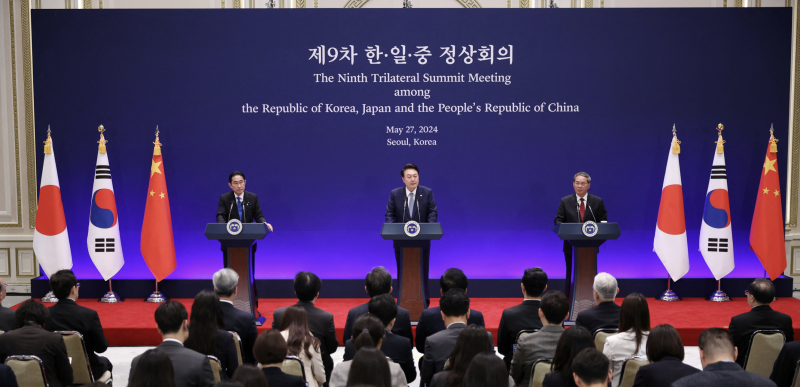
China’s Premier Li Qiang hailed a “new beginning” in the relationship with South Korea and Japan, as he met with South Korean President Yoon Suk Yeol and Japanese Prime Minister Fumio Kishida in Seoul for the first trilateral summit since 2019. China's President Xi Jinping did not attend the summit.
The three nations pledged to revive a security dialog and reignite negotiations towards a free trade agreement, as East Asia reckons with the regional implications of the United States’ attempts to gain an upper hand in its strategic rivalry with China.
In his remarks, Li was quick to suggest that politics should be entirely separate from economics and trading relationships, and made an appeal to end the drift towards protectionism and the decoupling of supply chains.
In his remarks, the Chinese Premier suggested that “For China, South Korea, and Japan, our close ties will not change, the spirit of cooperation achieved through crisis response will not change and our mission to safeguard regional peace and stability will not change." Li added that “we need to promote multipolarity in the world and oppose the formation of blocs or camps,” in a clear call for its neighbors to reject protectionism and embrace globalization, and a veiled criticism of the US’s policies.
The summit served more as a platform to reduce tensions and affirm commitment to trading ties in the midst of growing suspicion and rancor between the three nations, as South Korea and Japan, both US allies in East Asia, seek to navigate their relationships with Beijing and Washington, who are locked in strategic competition.
President Yoon and PM Kishida have sought to deepen their countries’ cooperation with the United States, on military matters and otherwise. This deepening of ties has come around the same time as the United States has sought to impose export controls on the selling of technical equipment such as microprocessors to Chinese firms and raised barriers to Chinese imports, levying high tariffs on electrical vehicles, batteries and medical equipment. China has responded to the election of Taiwan’s new president Lai Ching-te by initiating massive war games, simulating the invasion of the island.
The US has also called for Japan and South Korea, its allies, to shift their supply chains for key goods like semiconductors away from China. China, in turn, is attempting to cast the US as a meddler in East Asia’s affairs, dedicated to Beijing’s containment and suppression.
Experts believe that China seeks to lure Japan and South Korea away from US-led initiatives in the region, and to weaken the economic and security cooperation between South Korea, Japan and the US.
Li offered South Korea and Japan greater access to the Chinese domestic market, in a bid to diminish some of Washington’s economic influence. He met Samsung’s chair Lee Jae-yong to encourage the South Korean technology giant to invest in China, stating that “foreign funded enterprises are an indispensable force for China’s development, and China’s mega-market will always be open to foreign companies.”
In the midst of this fracturing of economic interdependence between the United States and China, East Asia also faces elevated tensions over Taiwan, which China claims as part of the mainland, and North Korea’s nuclear program.
China is North Korea’s only military ally and largest trading partner. Both Yoon and Kishida called upon North Korea not to carry out a scheduled rocket launch carrying a satellite. North Korea ignored these appeals, and proceeded with the launch, which ultimately ended in failure when the rocket exploded mid-flight.
In a quick riposte, North Korea released a statement condemning its neighbors’ joint commitment to denuclearize the Korean peninsula, terming it a “grave political provocation” that threatens its sovereignty.
South Korea, Japan and the US have previously urged China to use its influence and leverage to persuade Pyongyang to abandon its nuclear ambitions. Many experts believe that China provides clandestine aid to North Korea to sustain the regime in order for it to serve as a bulwark against growing American influence in the region.
The joint declaration released after the trilateral summit issued a call for formalizing diplomatic communication at the highest levels, with collaboration on climate change, health, trade and conservation. The declaration was unsurprisingly mute on military and security issues, but agreed to reopen negotiations for a trilateral free trade agreement.

